Context is Everything | |
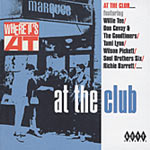
| My relationship with 2000 can probably be best summed up by this episode: on one of the very few occasions I watched TV, the last episode of One Foot In The Grave, I expected it to be a big emotional thing with everybody talking about it the next day. Yet, everyone was discussing some third division aristo walking of with a million from a quiz show. I just desperately wanted someone the share my amusement at one scene where Victor Meldrew was being 'entertained' by a wonderfully absurd cabaret version of Highway 61 Revisited. It was brilliantly odd. Anyway, the other TV moment that stuck with me (apart from a couple of Paolo di Canio flashes of genius) was the Dexys documentary, which was incredibly moving and haunting with the closing shot of Kevin Rowland walking away to the strains of 'Young Man'. For some reason I am reminded that it was Kevin Rowland who was responsible for me buying Highway 61 Revisited in my teens because he said it always made him cry. Ironically I have recently rediscovered the record and been playing it over and over, to make up for the ten years I had studiously ignored it. I suppose you could say I am studiously ignoring Dexys' records. I know they are classics. I don't need reminding of that. I don't need to keep revisiting the great records again and again. There is so little time to catch up with great music as it is. As I recall a Paul Morley review once saying 'If we are going to cover the same ground, let's at least do it at a different height.' |
Nothing bears this out better than the pile of Kent CDs I bought last year. Kent has been prospecting for nearly 20 years now, yet I would aver last year was their best to date, with eight or nine uplifting compilations plus plenty to catch up on from their back catalogue and more waiting out there to be explored. Just in case anyone doesn't know, Kent is part of the Ace group of labels, and in the '80s it completely revolutionised the soul scene by stylishly undermining the snob appeal of collecting rare pieces of vinyl, and replacing it with a whole new set of aesthetics where lovingly put together compilations brought the great black soul music to a new generation, uniting many souls from a broad spectrum of backgrounds. In so doing, they created their own mythology, wherein curator Ady Croasdell became a huge cult hero in his Harboro Horace guise. During most of the '90s Kent salvaged its own past as the CD format took over, and it is over the past few years that it has taken on a new lease of life with an astonishing string of releases. Understandably, most attention (including mine) has been focused on the Dave Godin's Deep Soul Treasures series, but just as much credit should be given to the neat negotiations which resulted in the Kent kingpins getting the keys to the Atlantic vaults. | |
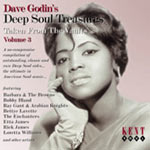
| Undoubtedly, the Deep Soul series has captured people's imaginations, with Dave Godin fulfilling the role of soul scholar, producing immaculate collections of lost and found deep soul sides, reinforcing how black music has at times captured something that can convey immense and intense emotion at once exquisitely moving and entirely cathartic, with however much meaning you need to attach to it. So that on one level it's great pop, and on another it can change your life. At a tangent, the first two instalments of Philip Roth's American Trilogy, American Pastoral and I Married A Communist were so shockingly moving and profound that 2000's third part The Human Stain was always going to be hard pressed to have as dramatic an impact. So, though it did turn out to be a great book, it was difficult not to feel a twinge of disappointment - as though the book struggled to cope with the burden of expectation. So, when the third instalment of Dave Godin's Deep Soul Treasures appeared last autumn, it was hard to resist that all too human sense of doubt. Yet there is no question that Volume 3 is every bit as powerful as its predecessors, and as the curator himself writes 'context is everything'. As ever the CD is worth buying for the wisdom of the great man's accompanying notes, creating that right context. Volume 3 maintains what is becoming the tradition of mixing what may be cherished soul moments with the unfamiliar, and both in such a context can be revelations. So, Maxine Brown's 'All In My Mind', Irma Thomas' 'I Wish Someone Would Care' and The Impressions' 'My Deceiving Heart' (from The Yong Mods' Forgotten Story) are on there with heart stopping soul churners such as 'Don't Leave Me Baby' by ray Grant, 'He's Gone' by Doris Duke, and 'I'm Missing You' by Loretta Williams. In fact, the drum motif on the Swamp Dogg produced Doris Duke track os so startling, I immediately put the CD player on endless repeat for the next 24 hours because I could not believe anything could be so perfect, and that such attention to detail could be attained. |
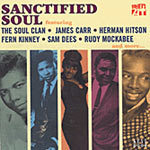
| Yet, as I mentioned, despite the words of praise rightly heaped on Godin and the label for the series, it is as much the plundering of the Atlantic soul and r'n'b archives which have contributed to Kent's renaissance. Indeed, during 2000, Kent put out at least three completely essential CDs collated from that particular goldmine, and I mean collated by Ady Croasdell and his colleagues with such zest you can envy them the hours spent in sifting through shelves of master tapes, conveniently forgetting the administrative nightmares which must be involved in progressing such projects. The one CD I really recommend is Sanctified Soul, a collection of the more unfamiliar deep selections from the Atlantic soul cellars. Perfectly, it bears out one of Kent's more endearing traits: it doesn't matter how great the collection, there's always one killer cut that stops you in your tracks and leaves you wondering how you got this far down life's crazy paving without it. On Sanctified Soul it is Sam Dees' 'Signed, Miss Heroin' from 1973, by popular consensus it seems judging from what I've picked up. It's a chilling number as you would imagine, and up there with Curtis' finest message songs. Which should come as no surprise as soul aficionados well acknowledge that as a writer, singer, producer and arranger, Sam Dees is up there with the best, and credit goes to Kent for pushing this. The Sam Dees track is followed by a lovely J P Robinson version of Dylan's 'George Jackson', but the other real stand out number is Judy Clay's 'the Greatest Love' (not that one, the Allen Toussaint number). When perusing the Kent catalogue it is one of my golden rules: if there is a Judy Clay track then buy it! I would refer you to the astonishing 'Lonely People Do Foolish Things' on the Sweet Sound Of Success, and 'He's The Kind Of Guy' from When A Man Cries, both from her Sceptre Wand days. Horrifyingly, Dave Godin notes that until very recently Judy Clay had never been interviewed by a music journalist. Completely outrageous. |
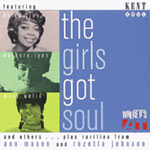
| While on the subject of femme-centric soul, the other Atlantic compilation on Kent from 2000 I have to mention is The Girls Got Soul or 'Atlantic distaff soul classics, rarities and unissued tracks from the '60s'. So, no danger of the trading standards people investigating complaints there. By the way, I don't know what's behind the omission of the apostrophe, but it gives me a chance to mention one of my favourite stories. When Shena Mackay's The Worlds Smallest Unicorn was about to be released, Private Eye ran a piece suggesting there were red faces at the publishers when it was noted an apostrophe was missing in the title. Shame they didn't read the book (and you must!), then they might have understood. Who has the red face Hislop? Anyway, The Girls Got Soul begins and ends in the best possible way. If The Sweet Inspirations' eponymous anthem and Aretha's 'Save Me' are familiar, here they remind me why I grew up loving the sound of electric guitars and songs that make you close your eyes and raise a clenched fist in a way that has nothing to do with rock. It ends with an exquisite combination of tracks from the Sweet Inspirations, Baby Washington, Mary Wells and Barbara Lynn. The latter is pictured inside in Martin Bramah-style left handed guitar meditative, magical pose. |
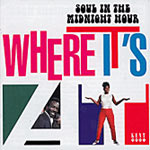
| To be fair, it was in 1999 that Kent began to free some of the greatest soul sides from the Atlantic vaults. The first two titles in the series were strikingly accessible, At The Club and the original Where It's At, with a mix of the ultra-familiar and (for me) wonderful discoveries. So, while you were forced to re-assess the 'classics' from Percy Sledge, Wilson Picket, Doris Troy, Aretha Franklin and Sam and Dave, you were more than impressed by the sheer majesty of the likes of 'Slip Away' by Clarence Carter, 'See Saw' by Don Covay, 'Tighten Up' by Archie Bell, 'Release Me' by Esther Phillips and Willie Tee's 'Walking Up A One Way Street'. Now that's what I call compensation! Taking the products as a whole, the packages are Kent at its best, with beautiful Phil Smee/Waldo's designs like the early LPs. Better still the booklet with Where It's At has a photo of young soul fans meeting Solomon Burke at the Black Prince, down the road from here, back in the mid '60s. The times they have changed, but not to worry as Paolo Hewitt's sleevenotes for At The Club are overtly modernistic and wonderfully evocative of his Cappuccino Kid days. Taking up a Paulo theme (and a word in the man's defence here: his Studs Terkel style Creation dossier is infinitely preferable to dozy Dave Cavanagh's rambling tome. Some have questioned Paolo's credentials, but why hasn't anyone challenged Cavanagh's? At least Paolo lets the Jasmine Minks get their dues...), as mod as I may be at heart, it's the '70s soul on the Atlantic series So Soulful '70s which gets my biggest thumbs up, and it's the one I most recommend. The killer cut here is 'Thin Line Between Love and Hate' by The Persuaders, which is as emotionally draining as the James Sallis / Lew Griffin novels I can't get enough of just now. The opening piano notes set the dramatic tone, and the tension grows as the harmonies haunt. It's hilarious on one level I guess, but once heard you won't forget it. |
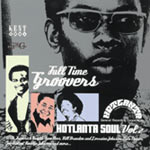
| There's plenty here to keep you shuffling and shimmying, aching and choking. The '70s soul thing with the broken beats, layers of brass and strings, and stabbing guitar lines are very much my thing at the moment, which I guess is why my favourite record of last year was Full Time Groovers, Kent's second volume of '70s soul sides from the Hotlanta stable and related labels in the Southern states. The first volume, by the way, came highly recommended by Steve Davis, the snooker star once popularly dubbed so boring yet who would become a true soul obsessive. It's easy to laugh at the dull persona, but how many other sportsmen have the nous to turn us on to such a great record? Stuart Pearce's name-dropping of the Lurkers doesn't really count! So, Volume 2 continues many of the same themes with Sam Dees and Frederick Knight dominating the credits, and putting in fine performances with 'Anything Is Fair In Love and War' and 'Time' respectively. It is, however, Joe Hinton who steals the show with 'Hanna's Love' which you could easily say is up there with the Chi-lites' 'Stoned Out Of My Mind' or Tyrone Davies' 'Can I Change My Mind', the two songs I would really plug to death when I was very deep into the '70s soul thing back in the days. These days I don't play songs to death, I play them to live, and I move on because there is so much to discover. Keep on prospecting! © Kevin Pearce 2001 |